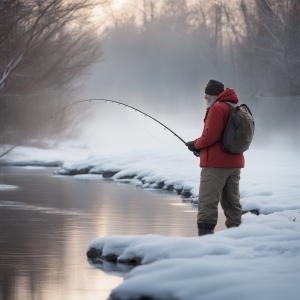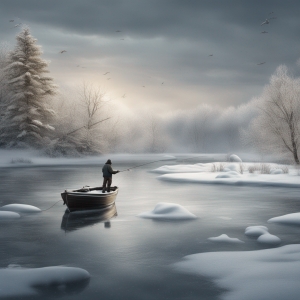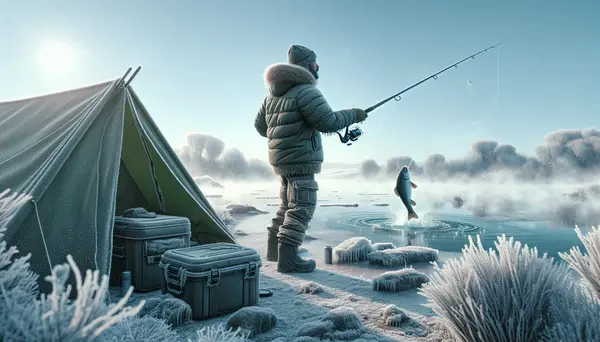Table of Contents:
Introduction: Winter Fishing Adventure
When the temperatures drop and the days grow shorter, many would-be anglers hang up their rods and settle in for a season away from the water. But for those daring enough to weather the chill, winter presents a unique angling landscape teeming with opportunities. Gone are the crowded lakesides and bountiful boat traffic, replaced with serene, icy vistas and hushed tranquility. Welcome to the world of winter fishing. With the right knowledge and preparation, the chilly months hold the potential for successful catches that will make your pals gasp with icy shock.
This article aims to break the ice on the subject of winter fishing. It explores tips, techniques, and tackles to help even a beginner enjoy fishing during the cold months, and provide the thrill of a catch even when the thermometer is on the downward spiral. So, if you’re ready to defy the elements and brave the cold, let’s dive in!
Understanding Winter Fish Behavior
The key to successful winter fishing lies in understanding the behavior of fish during the colder months. Fish are cold-blooded creatures, which means their body temperature and activity levels shift with the surrounding environment. When winter comes, and the water's temperature decrease, fish slow down, conserve energy, and often gather in predictable locations. This change in behavior presents unique challenges - and opportunities - for the winter angler.
During winter, fish generally seek deeper parts of the water bodies where the temperature remains relatively stable. They often stay closer to the bottom where the water is slightly warmer. It's, therefore, essential to adjust your fishing techniques, understanding where the fish might be in the water column at this time of the year.
Also, as fish are conserving energy, they tend to become less aggressive and particular about what food they will chase. This behavior requires the angler to use different bait and lures that can attract the fish despite their low energy level.
Pros and Cons of Winter Fishing
| Pros | Cons |
|---|---|
| Less competition due to fewer anglers | Harsher weather conditions |
| Fish are often grouped together | Increased equipment maintenance |
| Opportunity to catch larger fish | Potential safety risks (e.g., thin ice) |
| Unique challenge compared to other seasons | Need for different fishing gear |
Essential Equipment for Cold Weather Fishing

For any angling expedition, hardware is imperative. And it's no different when it comes to winter fishing. During the colder months, specific gear will enhance your comfort, safety, and ultimately, your fishing success.
Let’s start with what you’ll be wearing. Insulated, waterproof boots are a must. They’ll keep your feet dry and prevent them from freezing. Layering your clothes is also essential. Start with a base layer that wicks away moisture, an insulative middle layer, and a waterproof outer layer. This combination helps to trap heat and allows you to adjust your clothing according to your activity level and weather conditions.
A good pair of gloves is another must-have. However, they need to strike a perfect balance between providing warmth and allowing the dexterity you need to handle fishing equipment effectively. Ice-fishing specific gloves or mitts may be a good option.
As for the fishing equipment, a shorter rod is recommended for winter fishing since it offers better control. Also, because fish are typically more sluggish and less prone to chase bait during the winter, lures that are smaller, more colorful, and equipped with noise-making devices are more likely to grab their attention.
Lastly, you'll want to bring a thermos filled with a hot beverage. Not only will this keep you warm, but also it can be an excellent tool for thawing out reels and rod guides that may freeze up as you fish.
Tips for Successful Winter Fishing
For a productive winter fishing experience, here are some more tips. First, timing is crucial. Winter fishing often means that fish are less active during the traditional 'dawn and dusk' feeding times. The warmest part of the day, typically between 10 AM and 2 PM, tends to be the most productive time for winter fishing.
Second, patience is your greatest asset in this activity. Bites can be subtler in the winter, so an attentive and calm approach can make the difference between a missed catch and a victorious tug on the line. Pay attention to your line for any movement or twitches that could indicate a bite.
Don't forget to move around if you're not getting bites. Don't just stick to one area. Instead, experiment with different depths and locations. Drilling multiple holes in ice fishing can allow you to try different spots without having to re-bait and cast your line each time.
Lastly, consider winter fishing as more of a social experience than solitary. It’s a good opportunity to connect with other fishing enthusiasts, share tales and get advice. The camaraderie can help keep spirits high even if the fish aren’t biting.
Conclusion: Breaking the Ice in Winter Fishing

With the tranquility and serene beauty that comes with it, winter fishing can be a truly rewarding experience. As we've discovered, fish do behave differently in cold weather, but equipped with the right understanding of their behavior, the correct gear, patience and a calm approach, even the coldest days can yield a satisfying catch.
If you're willing to adapt, embrace the unique challenges of winter fishing, and invest in the right equipment, there's no reason why you can't enjoy successful fishing even when the mercury plummets. So go ahead, brave the frost, cast your line in the icy waters, and reel in not just fish, but also a winter fishing adventure you're bound to remember.
With this newfound knowledge, cold weather need never again mean a pause on your angling adventures. And remember, every catch you make under the ice or in the frosty air is a tale waiting to be told. So, here's to crisp days, clear, icy waters, and the thrill of winter fishing. Tight lines!
Frequently Asked Questions About Winter Fishing
What kind of fish can I catch in the winter?
Depending on the region, you can catch species such as perch, pike, trout or walleye during winter.
How does the cold temperature affect fish behavior?
Fish tend to be less active and stay in deeper waters when it's cold. You might have to adjust your fishing strategy accordingly.
What gear do I need for winter fishing?
You will need your regular fishing gear including a rod and baits. Additionally, consider clothing that protect you from cold weather conditions.
How can I stay safe while fishing in winter?
Ensure to check weather updates before heading out and dress appropriately. Carry safety gear with you and avoid fishing alone in isolated areas.
Does the type of bait change in winter?
Yes, certain baits like live minnows can be more effective in cold temperatures as they might mimic the winter food sources of fish.







